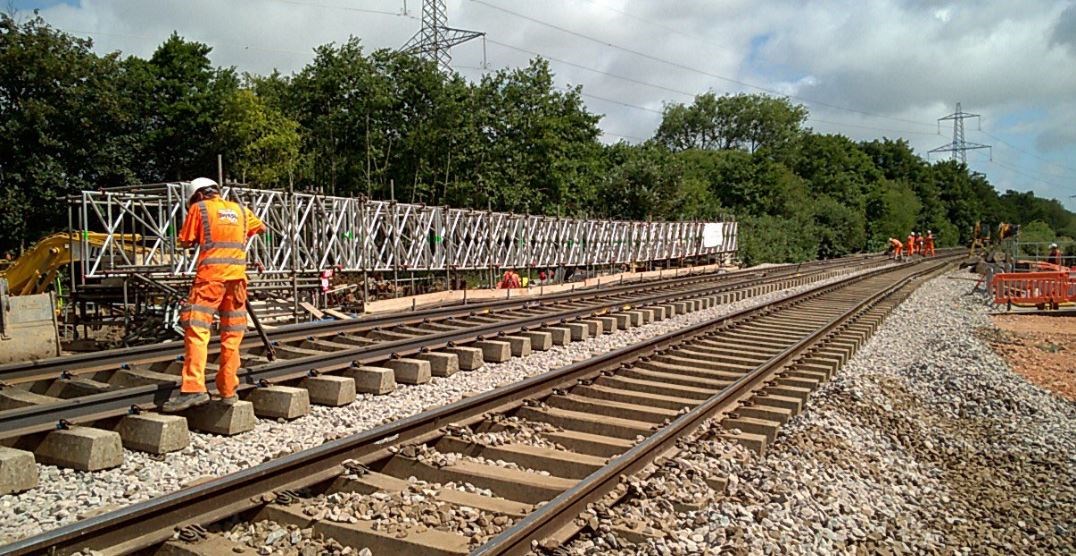Monday 9 Jul 2018
Team Orange successfully complete culvert installation work near Exeter as part of £26.5m flood alleviation scheme for the south west
- Region & Route:
- Wales & Western: Western
- | Wales & Western
The Great Western Mainline near Exeter in Devon reopened as planned this morning following the successful completion of culvert installation work by Network Rail’s Team Orange.
Engineers have been on site since Tuesday, working to install a new relief culvert at Cowley Bridge as part of a wider flood alleviation scheme to help improve resilience of the railway.
Flooding in the Cowley area has been a longstanding problem which has had a devastating impact on this part of the Great Western Mainline, resulting in numerous delays and closures.
Thirty-five members of Team Orange have been working around the clock since Tuesday 12 June to install twenty-four culvert units - hollow concrete rectangular structures - which will reduce the likelihood and severity of flooding on the railway. Each unit weighs approximately 14 tonnes and measures 4.1 metres wide by 2.1 metres tall.
Work will continue at Cowley Bridge until the end of the year, as Team Orange enlarge an existing culvert in the area to further improve the railway’s resilience.
Victoria Bradley, Network Rail’s Sponsor for the project said: “I’d like to thank passengers for their patience as we completed the installation of this brand new culvert, which is an important step forward in our Exeter flood resilience work.
“This project, along with our other flood resilience schemes in the region, will significantly reduce the number of times the south west is cut off during periods of extreme weather, reducing delays and improving passengers’ travelling experiences.”
The Cowley culverts project is one of a number of schemes under the Department for Transport’s Flood Resilience Programme. This £26.5m programme was established after extreme weather in 2012 and 2014 caused extensive disruption to the rail network. The aim of the programme is to reduce the risk of flooding at key locations in the Thames Valley and south west and ensure that when flooding does occur, train services can be resumed at a quicker rate, reducing disruption for passengers.
Managing director of CrossCountry, Andy Cooper, said: “Completing this work in such a short period of time means Network Rail have kept any disruption for our customers to a minimum. Extreme weather is increasingly causing problems for train services and this work at Exeter will ensure the railway is more resilient, helping maintain Devon and Cornwall’s important rail connections to the rest of Britain”.
More information about how flooding on the railways causes delays – and what we’re doing to reduce it – can be accessed here: https://www.networkrail.co.uk/running-the-railway/looking-after-the-railway/delays-explained/flooding/
Contact information
Passengers / community members
Network Rail national helpline
03457 11 41 41
Latest travel advice
Please visit National Rail Enquiries
Journalists
Network Rail press office -Western route
MediaRelationsWestern@networkrail.co.uk
About Network Rail
We own, operate and develop Britain's railway infrastructure; that's 20,000 miles of track, 30,000 bridges, tunnels and viaducts and the thousands of signals, level crossings and stations. We run 20 of the UK's largest stations while all the others, over 2,500, are run by the country's train operating companies.
Usually, there are almost five million journeys made in the UK and over 600 freight trains run on the network. People depend on Britain's railway for their daily commute, to visit friends and loved ones and to get them home safe every day. Our role is to deliver a safe and reliable railway, so we carefully manage and deliver thousands of projects every year that form part of the multi-billion pound Railway Upgrade Plan, to grow and expand the nation's railway network to respond to the tremendous growth and demand the railway has experienced - a doubling of passenger journeys over the past 20 years.
Follow us on Twitter: @networkrail
Visit our online newsroom: www.networkrailmediacentre.co.uk

